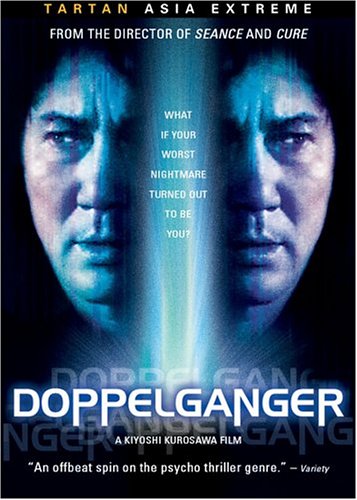Doppelganger review by Mike Long
I am fan of Asian horror films. Over the past few years, I've seen many movies from Japan, China, and Korea which have frightened and thrilled me. However, it has come to my attention that I'm not a fan of Japanese director Kiyoshi Kurosawa. I was disappointed by his much-hyped Kairo and vehemently disliked Cure. When I gave Cure a negative review, I received feedback from Kurosawa fans stating that I didn't delve deep enough into the film. So, when I began watching Kurosawa's Doppelganger, I made sure to pay close attention to the movie. All that this did was drive home just how bad this film is.
Kurosawa regular Koji Yakusho stars in Doppelganger as Michio Hayasaki. Hayasaki is a scientist who is working on an "artificial body" -- a wheelchair with mechanical arms which will aid quadriplegics. However, Hayasaki is under a great deal of stress, as his project is behind schedule and under-funded. One day, Hayasaki is confronted by his doppelganger, his exact double. At first, he avoids this man, but when the look-alike is in his apartment, Hayasaki is forced to speak with him. The double knows all about Hayasaki’s life and agrees to help him with his project. But, as Hayasaki begins to see his double more, his life grows very strange.
It’s very difficult to come up with a good idea for a movie. Yet, it’s ever more difficult to imagine a satisfying ending for a film. Doppelganger is a great example of this. The first hour of the movie is quite intriguing and satisfying. As Hayasaki begins to see his double more, we can’t help but begin to wonder exactly who this person is? Is he real or is he a figment of Hayasaki’s imagination? Is he truly a twin or some other kind of creature? In the film, Hayasaki meets a woman named Yuka (Hiromi Nagasaku) who tells him that those who see their doppelganger will soon die. This nugget adds to the suspense in the film. For much of the first two acts, Kurosawa does a fine job of showing Hayasaki and his double interacting, but never with anyone else present.
Up until this point, Doppelganger is nothing special, as it resembles many other “Is this real or is the main character crazy?” films, but the movie is watchable and contains enough mystery to hook the viewer. But then, it totally changes and subsequently falls apart in the third act. At the 1:20:00 point, Doppelganger becomes a completely different movie and most of the plot and all of the questions that the audience had get thrown out the window. What had been a psychological thriller, now becomes more of a heist movie. Yes, this sudden change is jarring, but it is by no means effective, giving one the feeling that some inattentive technician edited the ending of another film onto Doppelganger. In the extra features included on this DVD, Kurosawa comments that he wanted to make a comedy. “I wanted to do a Naked Gun.”, he says. Is that what this is supposed to be? Well, it isn’t funny and it isn’t entertaining. David Lynch could get away with this kind of bait-and-switch because he would at least fill a movie with bizarre images and characters. Doppelganger has the feel of a movie that was born without an ending, so the makers decided to simply change everything. This is truly a shame, as Kurosawa certainly shows talent as a filmmaker, as he knows how to frame a shot and likes long takes, but having now seen three of his films, I feel that his storytelling skills are lacking. (He resorts to some two and three panel split-screens in Doppelganger, which at first seem to add to the story, but soon come off as an attempt to be arty in the face of a weak script.) Doppelganger is a seriously disappointing film that only an evil twin could enjoy.
Doppelganger haunts DVD courtesy of Tartan Video USA. Tartan has long since been a provider of obscure films in Britain and they are now bringing their product to the US. Doppelganger has been letterboxed at 1.85:1 and the transfer is enhanced for 16 x 9 TVs. The film was shot with 24p HD cameras and the transfer gives us a mixed bag. The image is very clear and shows no grain whatsoever. However, objects in the background are often blurred and pixellated. Also, the actors are surrounded by noticeable haloes. The colors are good, but the image is somewhat dark at times. The DVD carries both a Dolby Digital 5.1 audio track, as well as a DTS 5.1 track. Both tracks provide clear dialogue and show off the creative sound design in the film. For the most part, Doppelganger is a quiet movie, save for when the double is in action, then it gets very loud. Both tracks do a good job of maintaining a nice dynamic range with these shifts in volume, but neither one is overwhelming. The English subtitles are clear and easy to read.
The Doppelganger DVD contains a few extras. “The Making of Doppelganger“ (20 minutes) contains spoilers, so don’t watch it first. The segment features interviews with the cast and crew, as well as a nice amount of behind-the-scenes footage. The DVD has a 5-minute interview with writer/director Kiyoshi Kurosawa where he does discuss the fact that the movie does change on purpose and becomes a comedy (?). The extras are rounded out by the trailer for Doppelganger, which is letterboxed at 1.78:1.



3 out of 10 Jackasses
Search
Doppelganger

IMDB Link: Doppelganger
DVD Relase Date: 2005-01-25
DVD Aspect Ratio: 1.85:1
DVD Extras: Featurette, Interview, Trailer
DVD Producer: Tartan Video USA